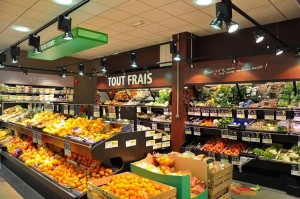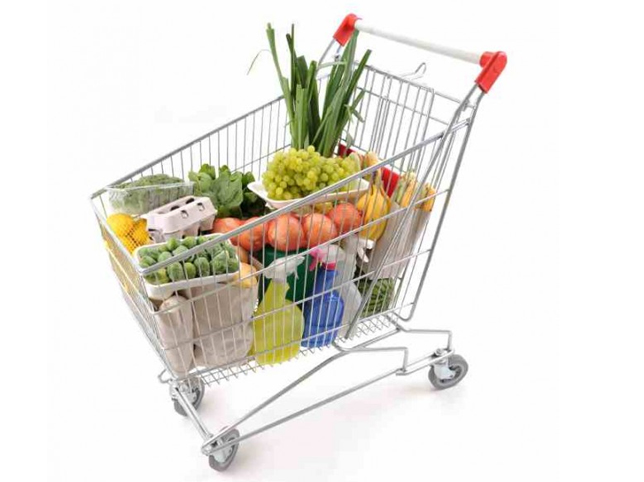Like the UK, supermarkets are everywhere in France and although they sell just about everything, the French still cling to their love of markets and independent retailers such as boulangeries (bakers) and pharmacies (chemists).
One of the first jobs you may need to do, after arriving in your gite, is to stock up on food and drink – but not necessarily in that order. Most visitors tend to head for the nearest supermarket. Famous names include Carrefour, Intermarché, Super U, Hyper U and E Leclerc. These usually have signs on main roads giving their location – Intermarché 2 mins à droite (Intermarché 2 minutes on the right). Whilst the directions may be correct the time might not be.
Before you set off, to do your shopping, you need to make sure you have two things. You will need a 1 euro coin for the trolley and some kind of bag or bags. French supermarkets have embraced a no free bags policy to help the environment. Many gite owners will have bags available for you to use or you can buy lifetime bags at the checkout.
There are some small differences between shopping in the UK and France. Some supermarkets expect  you to weight any loose fruit and vegetable you buy on scales within the fresh produce area. The scales have a digital screen with images of the various items for sale. Put you fruit or vegetables, in a plastic bag, on the scales and select the correct picture. The scales will print you a label to put on the bag. If there are no scales in the fresh produce area the checkout operator will weight you items.
you to weight any loose fruit and vegetable you buy on scales within the fresh produce area. The scales have a digital screen with images of the various items for sale. Put you fruit or vegetables, in a plastic bag, on the scales and select the correct picture. The scales will print you a label to put on the bag. If there are no scales in the fresh produce area the checkout operator will weight you items.
Bread comes in every shape and size and it’s good to try out the different loafs. Sliced bread is available but you often have to go hunting for it and you’ll usually find it somewhere near the biscuit isle. Sliced bread is often labelled as American Sandwich.
Much of the milk on display will be long life and sterilised. Like bread, you often have to look for lait frais (fresh milk) in the chilled area. There’s often only a small amount on display as apposed to the large displays in UK supermarkets. Another useful phrase is demi écrémé ( semi skimmed or half fat).
At the checkout, as in the UK, there’s little need for conversation but a cheery bonjour (hello) should be exchanged with the checkout operator. You may be asked if you have a carte du magasin (store card) or carte de fidélité (loyalty card). Usually, as a visitor you answer will be a polite non (no). As you leave a friendly au revoir (goodbye) will usually be answered by bonne journée (have a good day).
French supermarkets will accept UK bank cards but it’s wise to let your bank know that you are traveling abroad. Banks employ computer controlled anti-fraud systems which often block a card if it’s suddenly used in another country. If in doubt, try using a cash machine to see your balance – be aware, if you withdraw cash the exchange rate may be poor. To see your balance put your card in the machine and when you see the message Composez votre code confidential enter your pin number. Next select the option Solde and you should, if your card is working, see your balance. In many of the most popular tourist areas the ATMs have language options.
As you leave the supermarket it may be worth noting if they sell petrol. Most, larger, French supermarkets have a filling station and offer fuel at very competitive prices – often the cheapest in the area.
Update – We have been advised that the current trend, with some chains, seems to be to sell petrol at cost during shop opening hours (9h – 12h and 15h – 19h) and at a higher price when the shop is closed.


